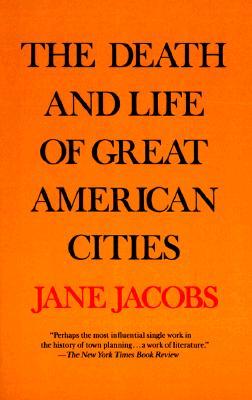RIP Jane Jacobs
Steve Payne for The New York Times
 TORONTO, April 25 (Reuters) - Jane Jacobs, the social activist and renowned urban development critic, died on Tuesday at age 89.
TORONTO, April 25 (Reuters) - Jane Jacobs, the social activist and renowned urban development critic, died on Tuesday at age 89.
Jacobs, an American-born Canadian, is best known for her book "The Death and Life of Great American Cities", which, since its publication in 1961, has become a standard text on urban issues.
Jacobs, who was born in Scranton, Pa., advocated density and mixed use in communities, staunchly opposed large highways and warned of urban sprawl.
She moved to Canada from the United States in the late 1960s, concerned about her two sons being drafted to serve in the Vietnam War.
"Jane Jacobs will be remembered as one of the great urban thinkers of our time," Toronto Mayor David Miller said in a statement. "Her contributions and insights have forever changed the way North American cities are developed."
On May 9, 1996, Jacobs was appointed an Officer of the Order of Canada.
"Her seminal writings and thought-provoking commentaries on urban development have had a tremendous effect on city dwellers, planners and architects," her citation on the Order of Canada Web site states. "By stimulating discussion, change and action, she has helped to make Canadian city streets and neighborhoods vibrant, liveable and workable for all."
In a 2001 interview for Reason magazine, she spoke about the distinctive nature each city should possess.
"It should be like itself. Every city has differences, from its history, from its site, and so on. These are important," she said. "One of the most dismal things is when you go to a city and it's like 12 others you've seen. That's not interesting, and it's not really truthful."
Jane Jacobs interviewed by James Kunstler
 TORONTO, April 25 (Reuters) - Jane Jacobs, the social activist and renowned urban development critic, died on Tuesday at age 89.
TORONTO, April 25 (Reuters) - Jane Jacobs, the social activist and renowned urban development critic, died on Tuesday at age 89. Jacobs, an American-born Canadian, is best known for her book "The Death and Life of Great American Cities", which, since its publication in 1961, has become a standard text on urban issues.
Jacobs, who was born in Scranton, Pa., advocated density and mixed use in communities, staunchly opposed large highways and warned of urban sprawl.
She moved to Canada from the United States in the late 1960s, concerned about her two sons being drafted to serve in the Vietnam War.
"Jane Jacobs will be remembered as one of the great urban thinkers of our time," Toronto Mayor David Miller said in a statement. "Her contributions and insights have forever changed the way North American cities are developed."
On May 9, 1996, Jacobs was appointed an Officer of the Order of Canada.
"Her seminal writings and thought-provoking commentaries on urban development have had a tremendous effect on city dwellers, planners and architects," her citation on the Order of Canada Web site states. "By stimulating discussion, change and action, she has helped to make Canadian city streets and neighborhoods vibrant, liveable and workable for all."
In a 2001 interview for Reason magazine, she spoke about the distinctive nature each city should possess.
"It should be like itself. Every city has differences, from its history, from its site, and so on. These are important," she said. "One of the most dismal things is when you go to a city and it's like 12 others you've seen. That's not interesting, and it's not really truthful."
Jane Jacobs interviewed by James Kunstler


1 Comments:
At 4:21 PM, K said…
K said…
Sad that book is a classic and a must read for ANY planner. Sad news.
Post a Comment
<< Home